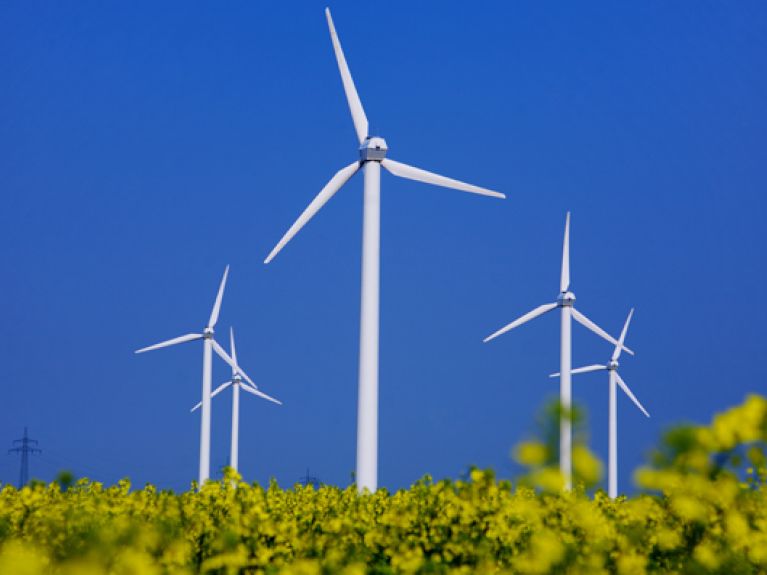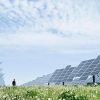A new energy era begins
Following the nuclear accident in Japan, Germany aims to phase out nuclear power within a decade.

The decision came earlier than expected and sent a clear international message: Germany wants to transform its energy system and phase out nuclear power. The governing CDU/CSU and FDP coalition has decided that the last of today’s 17 nuclear power plants will be disconnected from the grid by 2022 at the latest. It has thus followed the recommendation of its recently appointed Ethics Commission on Safe Energy Supply, which considers the phasing out of nuclear power possible within a decade. “We want the electricity of the future to be safe, reliable and economically viable,” said Federal Chancellor Angela Merkel at the end of May when she accepted the commission’s report. On 48 pages, the 17-member expert commission led by Professor Matthias Kleiner, President of the German Research Foundation (DFG), and Professor Klaus Töpfer, former Federal Environment Minister and former Executive Director of the UN Environment Programme (UNEP), outlined how this ambitious “joint task” can be accomplished. For ethical reasons, nuclear power plants should only continue to operate in Germany for as long as it takes for their capacity to be replaced by a lower risk energy supply system. This means that the seven oldest nuclear power stations and the nuclear plant in Krümmel will shut down now, because their output of 8.5 gigawatts can already be supplied by other energy sources that involve lower risks. Other nuclear power plants will gradually follow suit. The order will be determined by the risks associated with the individual plants and their significance for their regional electricity network. Most nuclear power plants should be switched off by 2021, but three reactors are to be held in readiness in case the energy transformation takes longer than planned. The shortfall in electricity output resulting from the closure of the nuclear plants will be covered by more efficient energy use, the expansion of renewable energies, the innovative use of fossil fuels and the reorganization of so-called capacity markets. The commission emphasizes that the phasing out of nuclear power is possible without negative effects on climate protection.
This change in German energy policy should be seen as a direct consequence of events in Japan. At the beginning of March 2011 a critical incident occurred at the Fukushima Nuclear Power Plant as a result of a serious earthquake and a tsunami – an accident that could no longer be controlled by the relevant safety systems. The shock felt in Germany was great – about the impacts of the earthquake, the devastating flood and the nuclear accident on the people and the environment. The area surrounding the power plant was so badly contaminated that a 20-kilometre exclusion zone was imposed and over 85,000 people had to be evacuated.
“We cannot simply carry on with business as usual,” said Federal Chancellor Angela Merkel in Berlin in mid-March. The accident at Fukushima led to a fundamental re-evaluation of the risk posed by nuclear power plants. As early as 15 March 2011 the Federal Government announced a moratorium for Germany’s seven oldest nuclear plants. They were initially shut down temporarily for a period of three months. The reason? These installations went on stream during the 1970s and have lower safety standards than the power plants that were built later. Some of them, the older boiling water reactors, have a similar design in some respects to the older installations in Fukushima. The moratorium was used to reassess the risks. The Federal Government appointed two commissions for this purpose: the Reactor Safety Commission (RSK), which is subordinated to the Environment Ministry, and the Ethics Commission, which was mentioned above. The Reactor Safety Commission was given the task of critically scrutinizing the 17 nuclear plants. The experts gave highly differentiated appraisals of the individual power plants. Overall, they present a “high level of robustness”, said the RSK chairman, Professor Rudolf Wieland. However, none of the German nuclear power plants met level 3, the highest safety standard defined by the RSK, for all review criteria. This required the ability to withstand a crash by a large passenger aircraft. However, almost all plants can survive an impact by a military aircraft or a medium-sized transport aircraft. Above all, the Ethics Commission was meant to answer a question posed by the Federal Chancellor: How can we complete the phase out with a sense of proportion so that the transition to the age of renewable energies is practical and reasonable?
Angela Merkel wants Germany to set an international example with its new energy policy. On 30 May in Berlin the Chancellor said Germany could become the first industrialized nation to pioneer the changeover to renewable energies. First of all, however, the Bundestag would have to make several legislative changes, for example, to the Atomic Power Act, the Grid Expansion Acceleration Act, the Energy Industry Act, the German Federal Building Code, the Ecological Energy Fund, the Combined Heat and Power Generation Act and the Renewable Energies Act. The Ethics Commission drew attention to the enormous economic and technological potential that the energy transformation would offer German industry. “Germany could show the international community that phasing out nuclear energy is ‘the’ opportunity for the high-performance economy,” it explained. Angela Merkel already raised the question of nuclear power plant safety at the G8 summit in France in May. The leading western industrialized countries and Russia agreed to regularly monitor the safety standards of nuclear power plants and to carry out stress tests following the EU model. Italy pointed out that a referendum was being planned. Japan made a clear commitment to renewable energies and greater energy efficiency.
The chances for a successful energy transformation in Germany are good. “Green electricity” was already experiencing a boom before 2011. Its share of electricity consumption increased from 5% in 1990 to 17%, which puts Germany at the top of the international ranking. The pace is to increase further until 2020, by which time the Federal Government aims to achieve a total of 35%. There are plans, among other things, to develop wind energy, especially through the construction of offshore wind farms, and to expand the high-voltage electricity grid by roughly 10%. The latter is primarily intended to facilitate the transmission of green electricity, which is generated in north Germany, to centres of consumption in southwest Germany. Additionally, it is planned to substantially increase the programme to modernize heating technology in buildings. This is particularly important for the overall energy concept, because buildings account for roughly 40% of energy consumption and their modernization could make a significant contribution to increasing efficiency and reducing carbon dioxide emissions. That would reduce the consumption of natural gas in this sector, which could then increasingly be used to generate electricity in power stations. Gas-fired power plants, which can be fired up and shut down quickly, are best suited to evening out the fluctuations in the output of green electricity generated using wind and solar power.

